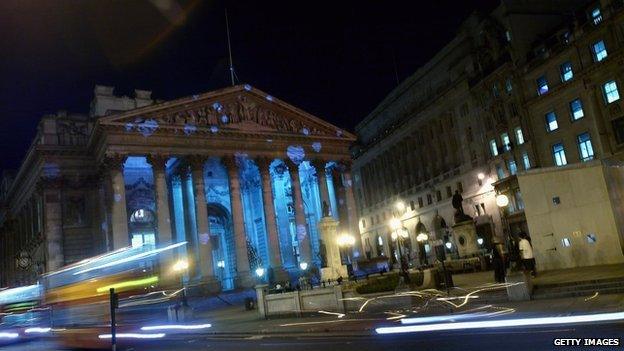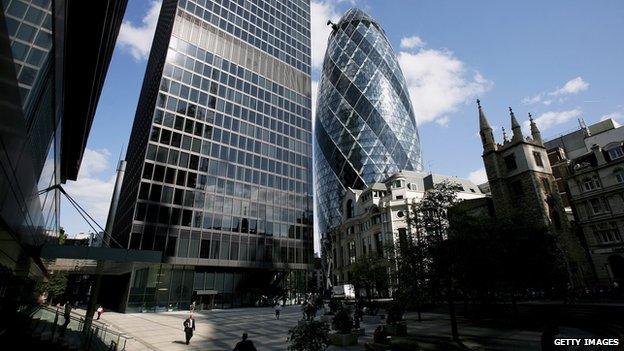Scottish independence: A tale of two financial centres
- Published

The Royal Exchange was opened as a marketplace in the City of London 443 years ago
As Scotland decides whether to become an independent nation, some financiers are asking themselves what this could mean for two of the oldest money centres in the world: London and Edinburgh.
While the City of London tends to grab more headlines, Edinburgh is the UK's second largest financial centre, employing thousands of people in financial services.
Where will banks, investors, brokers, lawyers and accountants choose to ply their trade if the UK were split?
"If in doubt, people may say they don't want to take the risk - they gravitate to London, where more deals can be done," says Prof Ranald Michie of the University of Durham, a financial historian who has studied the City of London for 35 years.

Edinburgh: already a flourishing financial centre
Financial firms have fewer physical constraints to consider compared to a shipyard or a distillery. And they're likely to move to where they can find other companies to provide the advice and services they need, and where they can recruit skilled staff in the greatest abundance, says Prof Michie.
'Advantage'
Scottish lender Royal Bank of Scotland has said it will move its legal centre to London in the event of a Yes vote, but has no plans to move jobs.
Banks like RBS already have large offices in London they can simply nominate as their new head office, says Peter Hahn, a former Citigroup banker who is now a senior lecturer at Cass Business School.
"Many of these companies are really run from London anyway."
But for Scotland independence could also create opportunities.
.jpg)
Financial centres can be surprisingly resilient during times of great upheaval
"What has grown up in Edinburgh is fund management and insurance," says Prof Michie. "For them, the gravitational pull of London is much, much less - Scotland has cheaper rents, cheaper labour. But they have done well tapping business in the UK, so they would need to try to keep that."
Edinburgh could create a business environment to suit its strengths and attract more insurers and asset managers, he says.
"But it will be difficult to stop other cities and financial centres doing the same."
'Bolshy populace'
But the City of London stands to gain too in the event of independence, according to Sir Martin Jacomb, former chairman of insurer Prudential and of BZW, Barclays' first foray into investment banking.
"London will become somewhat busier than it was before," he says. "Some Scottish businesses and also Scottish people will move."
Writer Nicholas Shaxson also thinks the City of London could benefit from an independent Scotland, although by less high-minded means. He is author of Treasure Islands, a book about tax havens. One of the City's big businesses is helping companies and the wealthy pay less tax, he says.
"Scottish people have always been vibrant contributors to British democracy, and history has shown that one thing the City doesn't like very much is democratic demands from a big and bolshy populace.
"A reduction in the UK population would lessen democratic pressures, somewhat, and make the UK look still more like a tax haven than it already is."
An independent government in Edinburgh might decide to keep taxes on the financial sector low as the two cities compete with each other to attract businesses, says Mr Shaxson.

London's advantages of language, law and free flow of capital will continue, says Sir Martin Jacomb
The winners either way would be lawyers, accountants and advisers, says Cass Business School lecturer Dr Hahn.
This would be "a gift for the legal community" who would be tasked with unpicking all the rules, helping Scotland in joining the EU, and negotiating all the other international agreements for an independent Scotland, he says.
"Consultants and accountants will also be winners. And all their expertise is in London."
'Welcome home'
But others are more concerned about the impact the sundering of the UK would have on the City.
Uncertainty over what currency an independent Scotland would use and how the national debt would be reordered has already worried investors.
"The City's success is due to its stability," says James Maltin, a London-based investment director at Rathbones, which has managed money since at least 1742. It currently looks after £23.9bn for its clients.
"We've been a very welcome home for investors. People internationally have come to live and work here. This casts doubt on that stability."
A recent drop in the value of the pound as investors sell the currency shows the independence question "has the potential to have quite a severe impact in the minds of investors," he says.
Yet the City of London and its financial houses have seen an environment such as this before, and survived, when nations such as the Republic of Ireland and India became independent.
"I would imagine there would be a short-term hit, to be sure, but I think that one of the City's historical characteristics is its adaptability," says Mr Shaxson.

The City's army of lawyers and consultants could be the winners of an independent Scotland
But the difference this time is the speed with which markets can react and decisions can be made, says Iain Anderson, a director and chief corporate counsel at City adviser Cicero Group.
"We live in a digital world, which means markets can react more quickly," he says. Billions of pounds can be moved across the world at the push of a button - away from the City, if investors so choose. That was not possible in the 1920s and 1940s.
The critical thing for UK finance, he says, is London's status as a way to trade with the EU. The UK generates a trade surplus of £44bn through finance, and a third of that is from trade with the EU, external, according to TheCityUK, the financial business lobby group.
"One of the things people are pricing in if Scotland leaves the UK, is the likelihood of the rest of the UK withdrawing from Europe," says Mr Anderson.
That scenario is more likely, says Mr Anderson, if Scotland gains independence, since the rest of the UK will be left with a higher concentration of voters happy to leave the EU.
"As long as London is a gateway into the EU, it's still the place to be for foreign exchange and trading. That will be more in question if Scotland is not a part of the UK."